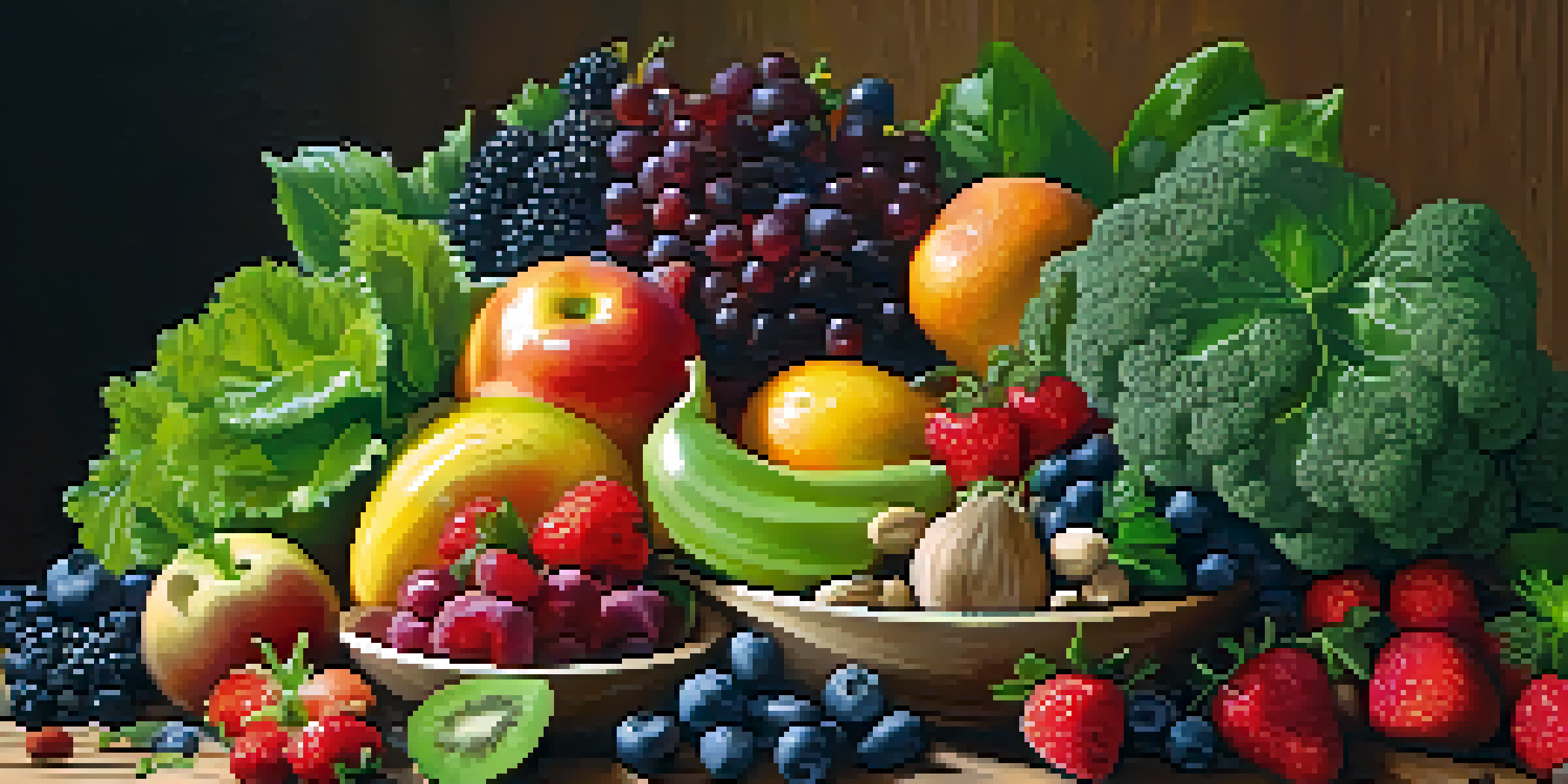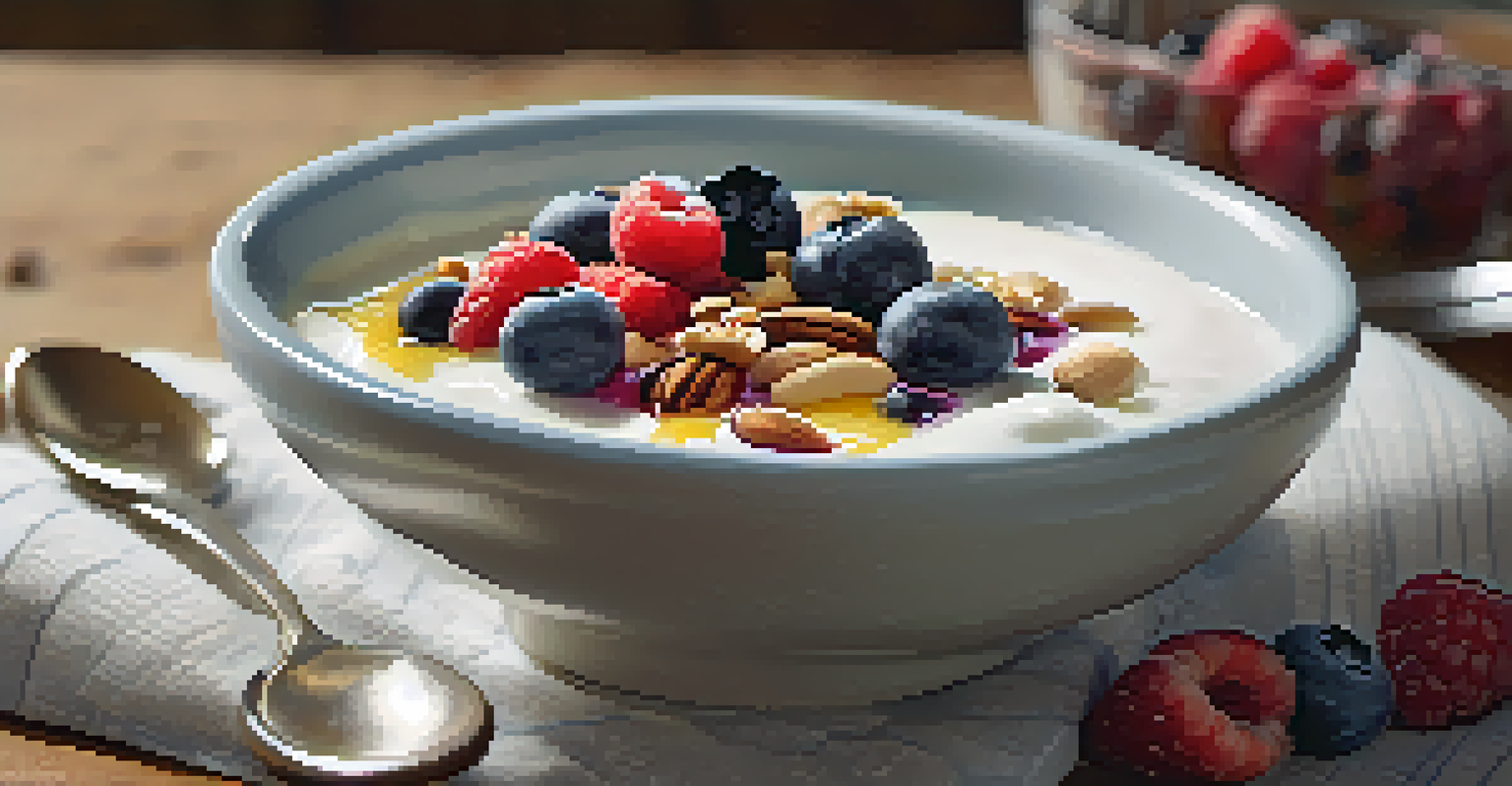The Role of Antioxidants in Raw and Functional Foods

What Are Antioxidants and Why Do We Need Them?
Antioxidants are natural compounds that help protect our cells from damage caused by free radicals—unstable molecules that can lead to chronic diseases. Think of free radicals as the troublemakers in our body, constantly trying to create chaos. Antioxidants neutralize these troublemakers, maintaining cellular health and overall well-being.
Antioxidants are the body's natural defense system against free radicals, and they play a vital role in maintaining health and preventing disease.
Our bodies produce some antioxidants naturally, but we also need to obtain them from our diet. This is where raw and functional foods come into play; they are often rich sources of these vital compounds. Including a variety of these foods in our daily meals can significantly enhance our antioxidant intake.
Incorporating antioxidants into our diet is crucial for preventing oxidative stress, which is linked to aging and various health issues, including heart disease and cancer. By understanding their importance, we can make informed choices about the foods we eat.
Sources of Antioxidants in Raw Foods
Raw foods, such as fruits, vegetables, nuts, and seeds, are packed with antioxidants. For example, berries like blueberries and strawberries are not only delicious but also loaded with powerful antioxidants known as flavonoids. Eating these raw preserves their nutrient content, making them a great choice for boosting your antioxidant intake.

Vegetables like kale and spinach are also excellent sources, providing vitamins A, C, and E, which are known for their antioxidant properties. Enjoying these veggies in salads or smoothies helps maintain their nutritional integrity. Plus, the vibrant colors of these foods often signify high antioxidant levels.
Antioxidants Protect Cellular Health
Antioxidants neutralize free radicals, helping to prevent chronic diseases and maintain overall well-being.
Incorporating a rainbow of raw foods into your diet ensures a diverse range of antioxidants. This diversity supports various bodily functions and promotes overall health, showcasing just how vital these foods are for our well-being.
Functional Foods: A Boost to Antioxidant Intake
Functional foods are those that provide health benefits beyond basic nutrition, often enriched with antioxidants. Examples include fortified cereals, probiotic yogurts, and plant-based beverages infused with additional vitamins and minerals. These foods can play a significant role in enhancing your antioxidant levels.
Let food be thy medicine and medicine be thy food.
Many functional foods are designed to target specific health concerns, such as heart health or immune support. For instance, foods rich in omega-3 fatty acids, like chia seeds or flaxseeds, often contain antioxidants that contribute to their heart-healthy benefits. Choosing functional foods can be a proactive step in supporting overall wellness.
Incorporating functional foods into your diet is an easy way to boost your antioxidant intake without compromising on taste. They can be enjoyed in various forms, making it simple to include them in your meals and snacks.
The Synergy of Antioxidants in Whole Foods
One of the remarkable aspects of antioxidants in whole foods is their synergistic effect. This means that the antioxidants work better together than alone, enhancing their overall health benefits. For example, combining fruits and nuts in a snack not only provides a variety of antioxidants but also promotes better absorption in the body.
Whole foods are often more effective than supplements in delivering antioxidants, as they contain a complex mix of nutrients that work together. This complexity is often lost in processed foods or isolated supplements, making whole foods the superior choice for antioxidant intake. Think of whole foods as a team working together for your health.
Raw Foods Are Rich in Antioxidants
Fruits, vegetables, nuts, and seeds are packed with antioxidants, making them essential for a healthy diet.
By focusing on whole foods in your diet, you ensure that you're getting a balanced array of antioxidants. This approach not only supports your health but also encourages a more enjoyable and diverse eating experience.
Cooking Methods: Preserving Antioxidants
While raw foods are excellent sources of antioxidants, cooking can also play a role in enhancing their availability. Certain cooking methods, like steaming or sautéing, can actually increase the antioxidant levels in some vegetables, making them more bioavailable. This means your body can absorb and utilize these antioxidants more effectively.
However, overcooking or frying can lead to a loss of nutrients, including antioxidants. It's essential to find the right balance in cooking methods to maximize the health benefits of your meals. For instance, lightly steaming broccoli can enhance its antioxidant properties while maintaining its vibrant color and crunchiness.
Being mindful of cooking methods allows you to enjoy a range of flavors and textures while still reaping the benefits of antioxidants. Experimenting with different techniques can lead to discovering new favorite recipes that are both delicious and nutritious.
Antioxidants and Their Role in Disease Prevention
Research has shown that a diet rich in antioxidants may help reduce the risk of chronic diseases. For instance, antioxidants can play a role in lowering inflammation, a key contributor to conditions like arthritis and heart disease. By including antioxidant-rich foods in your diet, you're taking a proactive step toward preventing these health issues.
Furthermore, antioxidants are linked to improved brain health. Studies suggest that diets high in antioxidants may help protect against neurodegenerative diseases like Alzheimer's. This highlights the importance of not only consuming these nutrients but also promoting cognitive health through what we eat.
Cooking Methods Affect Antioxidants
Certain cooking techniques can enhance the bioavailability of antioxidants, improving their absorption in the body.
Incorporating a variety of antioxidant-rich foods into your meals can be a delicious way to support your long-term health. It's about making choices that benefit both your body and mind, ultimately leading to a healthier lifestyle.
Incorporating Antioxidants into Your Diet
Making antioxidants a regular part of your diet doesn't have to be complicated. Start by adding more colorful fruits and vegetables to your meals; think salads, smoothies, or stir-fries. This simple change can significantly increase your antioxidant intake while making your meals more vibrant and appealing.
You can also explore new recipes that focus on antioxidant-rich ingredients. For example, try a breakfast bowl with yogurt, berries, and nuts for a delicious and nutritious start to your day. The more creative you get with your meals, the easier it becomes to incorporate these health-boosting foods.

Lastly, consider swapping out processed snacks for whole food alternatives like trail mix or vegetable sticks with hummus. These small changes can lead to significant improvements in your overall health, making antioxidants a fun and enjoyable part of your daily routine.